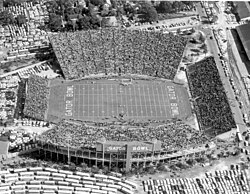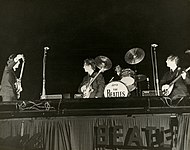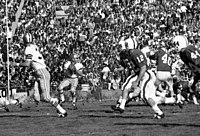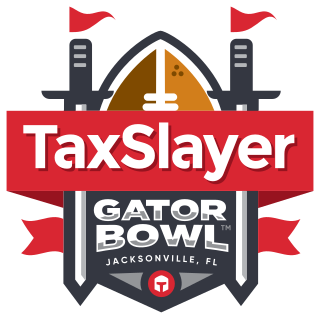
The Gator Bowl is an annual college football bowl game held in Jacksonville, Florida, usually contested on or around New Year's Day. It has been held continuously since 1946, making it the sixth oldest college bowl, as well as the first televised nationally. The game was originally played at Gator Bowl Stadium through the December 1993 game. The December 1994 game was played at Ben Hill Griffin Stadium in Gainesville after the namesake stadium was demolished to make way for a replacement venue, Jacksonville Municipal Stadium. That venue, now known as EverBank Stadium, has been home to the Gator Bowl since the January 1996 game.
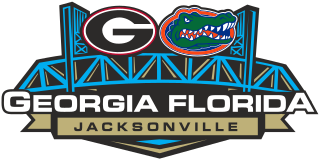
The Florida–Georgia football rivalry is an American college football rivalry game played annually by the University of Florida Gators and the University of Georgia Bulldogs, both members of the Southeastern Conference. The programs first met in 1904 or 1915 and have played every season since 1926 except for a war-time interruption in 1943. It is one of the most prominent rivalry games in college football, and it has been held in Jacksonville, Florida since 1933, with only two exceptions, making it one of the few remaining neutral-site rivalries in college football. The game attracts huge crowds to Jacksonville, and the associated tailgating and other events earned it the nickname of the "World's Largest Outdoor Cocktail Party", although that name is no longer officially used.

Tampa Stadium was a large open-air stadium located in Tampa, Florida, which opened in 1967 and was significantly expanded in 1974–75. The facility is most closely associated with the Tampa Bay Buccaneers of the National Football League, who played there from their establishment in 1976 until 1997. It also hosted two Super Bowls, in 1984 and 1991, as well as the 1984 USFL Championship Game. To meet the revenue demands of the Buccaneers' new owners, Raymond James Stadium was built nearby in 1998, and Tampa Stadium was demolished in early 1999.
EverBank Stadium is an American football stadium in Jacksonville, Florida, United States. It is the home facility of the Jacksonville Jaguars of the National Football League (NFL), and the headquarters of the professional wrestling promotions All Elite Wrestling (AEW) and Ring of Honor (ROH).

Hurricane Dora was the first tropical cyclone on record to make landfall over the Atlantic coast of North Florida at hurricane intensity. The sixth tropical storm and second hurricane of the 1964 season, Dora developed from a tropical wave near the coast of Senegal on August 28. The depression intensified into Tropical Storm Dora late on August 31. It then curved northwestward and continued to strengthen. By late on September 2, Dora became a Category 1 hurricane. Intensification slowed somewhat, with Dora becoming a Category 2 hurricane on September 4 and then a Category 3 hurricane on next day. Deepening further, the storm briefly peaked as a Category 4 with maximum sustained winds of 130 mph (215 km/h) on September 6. Dora soon weakened to a Category 3 hurricane and then a Category 2 hurricane while curving westward early the following day.

Ben Hill Griffin Stadium, popularly known as "The Swamp", is a football stadium in Gainesville, Florida, United States. It is located on the campus of the University of Florida and is the home field of the Florida Gators football team. It was originally known as Florida Field when it opened as a 22,000-seat facility in 1930, and it has been expanded and renovated many times over the ensuing decades. Most of the university's athletic administration offices have been housed under the west stands of the stadium since the 1960s. It was also home to most football offices and training areas until a large stand-alone facility for the program opened nearby in 2022.

The Florida–Miami football rivalry is an American college football rivalry between the Florida Gators football team of the University of Florida and Miami Hurricanes football team of the University of Miami. The game was played annually from 1944 until 1987, and is now played intermittently. The winning team was formerly awarded the Seminole War Canoe Trophy. Today, the round robin winner of the three schools in the state of Florida receives the Florida Cup for beating the other two schools in the same season. The two teams will next play in the 2025 season. Miami leads the series 30–27.
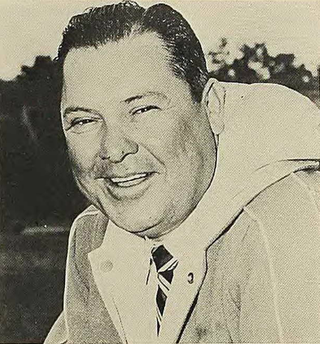
Charles William Tate was an American football player and coach. Tate served as the head coach of the University of Miami for six seasons during the 1960s and two games during the 1970 season.

The Florida Gators football program represents the University of Florida (UF) in American college football. Florida competes in the Football Bowl Subdivision (FBS) of the National Collegiate Athletic Association (NCAA) and the Southeastern Conference (SEC) They play their home games on Steve Spurrier-Florida Field at Ben Hill Griffin Stadium on the university's Gainesville campus.
The 1973 Florida Gators football team represented the University of Florida during the 1973 NCAA Division I football season. The season was Doug Dickey's fourth as the Florida Gators football team's head coach. Dickey's 1973 Florida Gators finished with a 7–5 overall record and a 3–4 Southeastern Conference (SEC) record, tying for fifth among ten SEC teams.
The 1990 Florida Gators football team represented the University of Florida during the 1990 NCAA Division I-A football season. The season marked the return of the Gators' Heisman Trophy-winning quarterback Steve Spurrier to his alma mater as the new head coach of the Florida Gators football team.
Jacksonville is home to a number of professional sports teams, and the city has a long history of athletics. The Jacksonville Jaguars of the National Football League (NFL) compete at the major league level. Additionally, the PGA Tour is headquartered in the suburb of Ponte Vedra Beach, where it hosts The Players Championship every year. All Elite Wrestling, the second-largest professional wrestling promotion in the U.S. behind WWE, has its headquarters in the Jaguars' stadium, largely due to its shared ownership with the Jaguars.

The 2009 Florida Gators football team represented the University of Florida in the sport of American football during the 2009 college football season. The Gators competed in the Football Bowl Subdivision (FBS) of the National Collegiate Athletic Association (NCAA) and the Eastern Division of the Southeastern Conference (SEC), and played their home games at Ben Hill Griffin Stadium on the university's Gainesville, Florida campus. They were led by fifth-year head coach Urban Meyer, who coached the Gators to a first-place finish in the SEC East, a 51–24 Sugar Bowl victory over the Cincinnati Bearcats, and an overall win–loss record of 13–1 (.929).
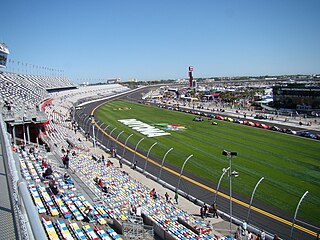
The U.S. state of Florida has three National Football League teams, two Major League Baseball teams, two National Basketball Association teams, two National Hockey League teams, two Major League Soccer teams and 13 NCAA Division I college teams.

The 2014 Florida Gators football team represented the University of Florida in the sport of American football during the 2014 NCAA Division I FBS football season. The Gators competed in the Football Bowl Subdivision (FBS) of the National Collegiate Athletic Association (NCAA), and the Eastern Division of the Southeastern Conference (SEC). They played their home games at Ben Hill Griffin Stadium on the university's campus in Gainesville, Florida. The 2014 season was the Gators' fourth and final season under head coach Will Muschamp.
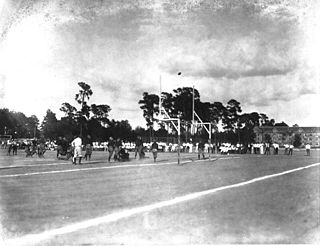
Fleming Field was the first on-campus home for the football and baseball teams representing the University of Florida in Gainesville. Construction began in 1910, and the facility debuted as the home field for Florida Gators outdoor sports programs during the spring semester of the 1910-1911 academic year.

The 2016 Florida Gators football team represented the University of Florida in the sport of American football during the 2016 NCAA Division I FBS football season. The Gators played their home games at Ben Hill Griffin Stadium in Gainesville, Florida, and competed in the Eastern Division of the Southeastern Conference (SEC). They were led by second-year head coach Jim McElwain. They finished the season 9–4, 6–2 in SEC regular season play to represent the Eastern Division in the SEC Championship Game where they lost to Alabama. They were invited to the Outback Bowl where they defeated Iowa.

The 2017 Florida Gators football team represented the University of Florida in the 2017 NCAA Division I FBS football season. The Gators played their home games at Ben Hill Griffin Stadium in Gainesville, Florida. Florida played as a member of the Eastern Division of the Southeastern Conference (SEC). They were led by third-year head coach Jim McElwain until his dismissal on October 28, after which defensive coordinator Randy Shannon served as the interim head coach until the end of the season.

The English rock group the Beatles toured the United States and Canada between 19 August and 20 September 1964. The 32 concerts comprised the second stage of a world tour that started with the band's tour of Europe, Hong Kong, Australia and New Zealand, and finished with their UK Autumn tour. The shows in the United States were a return to the country after their brief February 1964 tour.

The 2022 Florida Gators football team represented the University of Florida in the 2022 NCAA Division I FBS football season. The Gators played their home games at Ben Hill Griffin Stadium in Gainesville, Florida, and competed in the Eastern Division of the Southeastern Conference (SEC). They were led by first-year head coach Billy Napier.
